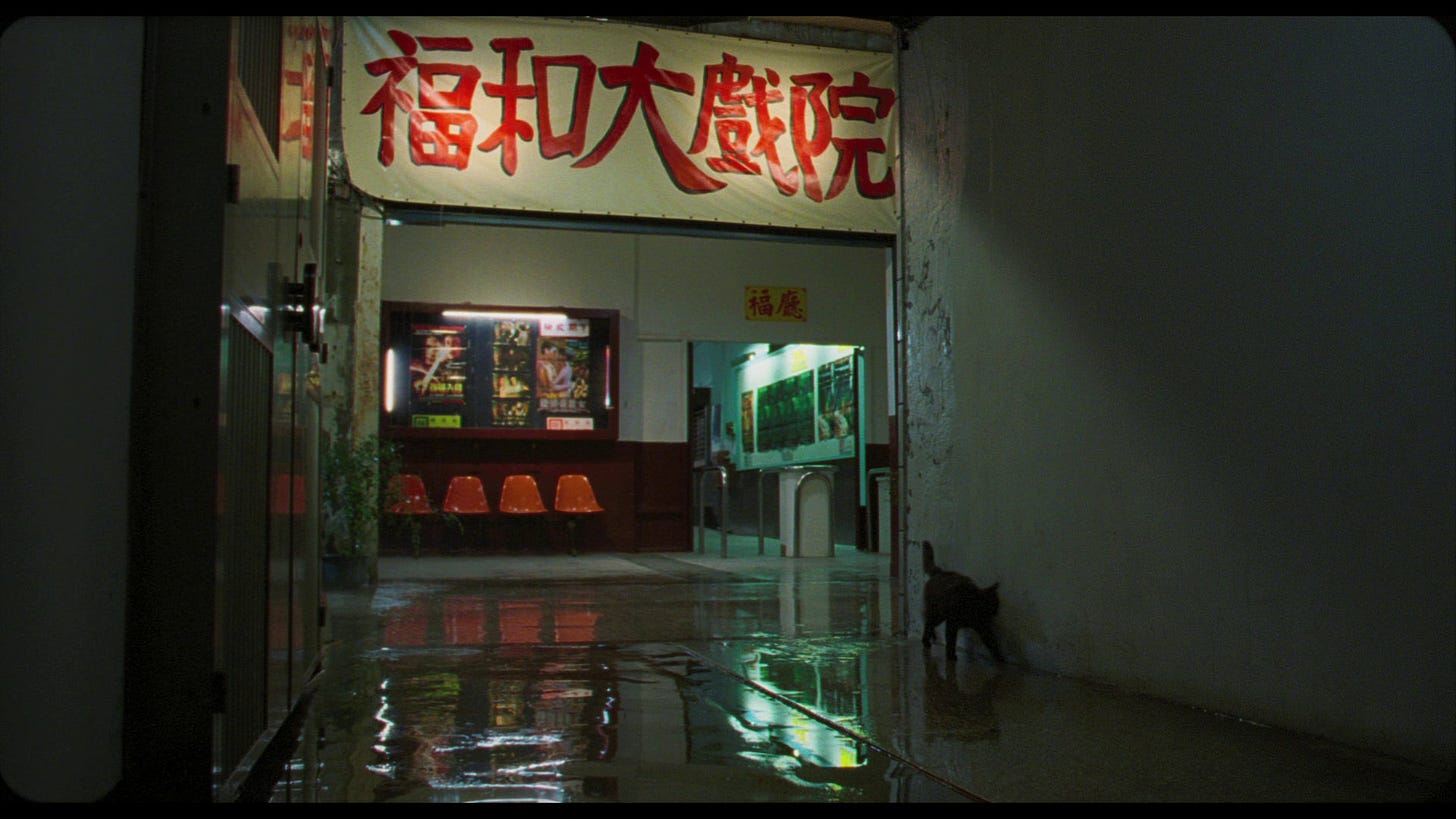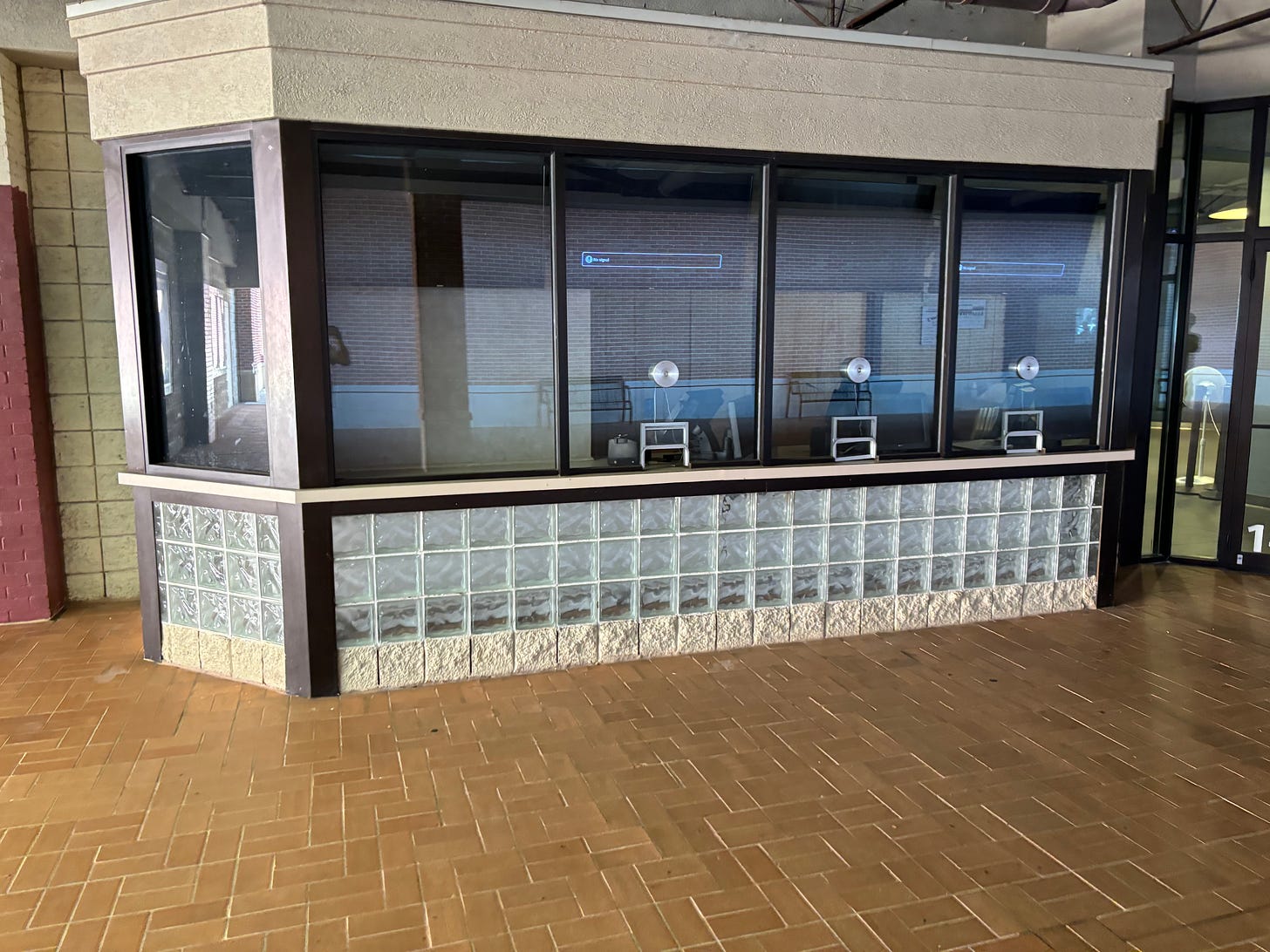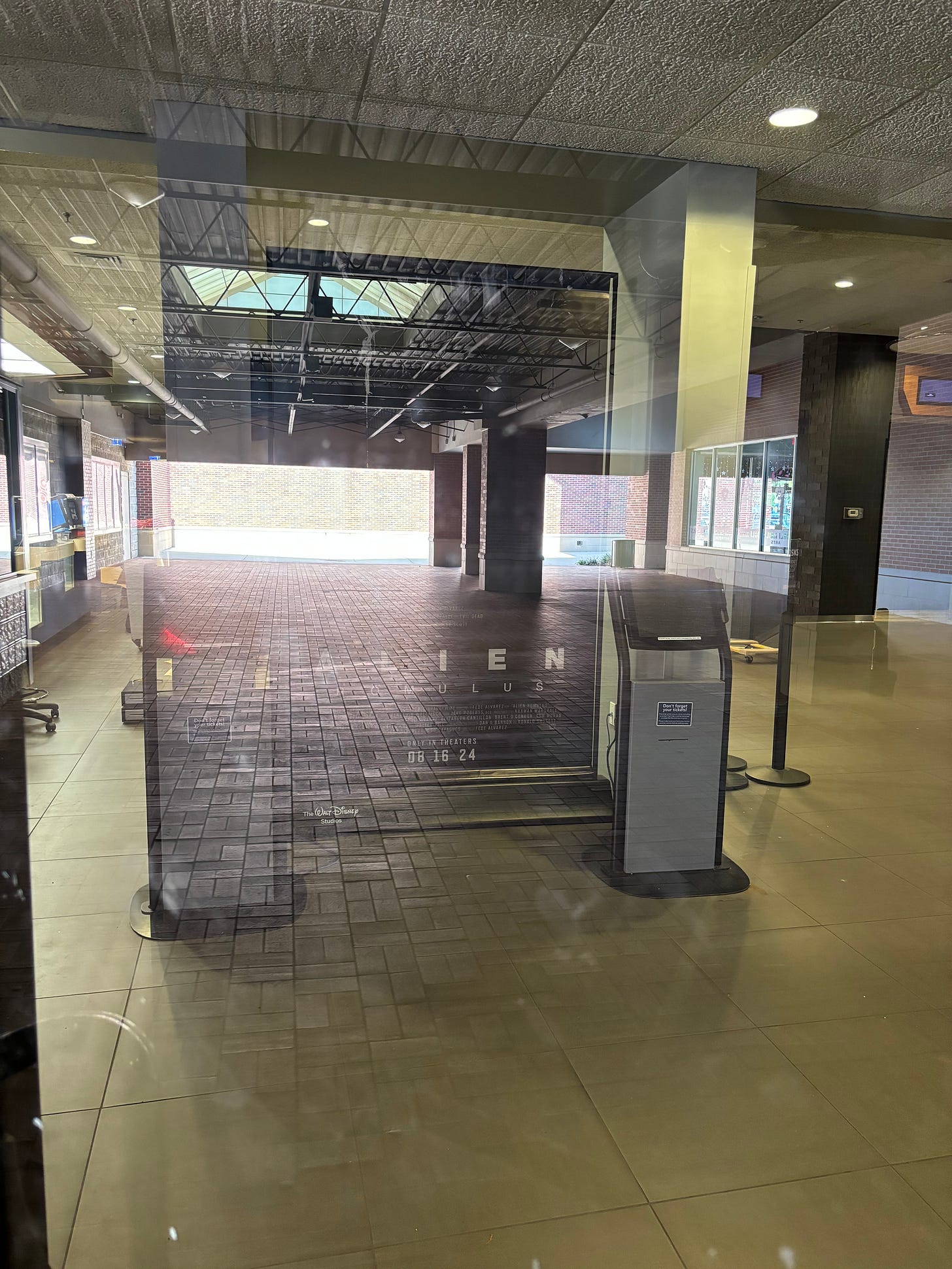This past week, I went up to Athens to briefly visit the weeklong in-person meetings for the low-residency MFA screenwriting program, from which I graduated 3 years ago this month. I was set to meet my mentor at the residency’s host hotel at 5:30. I got there somewhat early and, needing something to do with the extra time, I pulled into the Beechwood shopping center on the corner of Broad Street and Westlake within which was one of the movie theaters I frequented while an undergrad. I saw some of the most significant films of my young life - Punch Drunk Love, Adaptation, Kill Bill Volume 1 - in those seats. I had not been inside in over twenty years, and while I wouldn’t be doing so today I still wanted to stop by and check it out, perhaps see how it had changed. The first thing I noticed was that the roadside marquee was empty. I felt a sinking in my stomach that went deeper when, pulling up to the building, I was greeted by lettering thanking everyone for their patronage over the years. The theater had closed.
I parked my car and approached the facility nonetheless.
A little over halfway through Tsai Ming-Liang’s Goodbye Dragon Inn, in which a scattering of lost souls prowl the Fu-Ho Grand movie theater on its last night of operation before closing for good, a mysterious man encountered in a back hallway utters one of the film’s only lines of spoken dialogue:
Do you know this theater is haunted? This theater is haunted. Ghosts.
The only other conversation in the movie happens towards the end, once the theater’s final screening lets out and a chance meeting between two aging actors produces what feels like a sadly prescient interaction:
Shih Chun: Teacher, you came to see the movie?
Tien Miao: I haven't seen a movie in a long time.
Shih Chun: No one goes to the movies anymore, and no one remembers us anymore.
Tsai’s film indeed plays as something of an early eulogy for cinema-going as we then knew it. Released in the early 2000s, right as the digital revolution was beginning to take hold, it seems to presage a future in which the movie theater will no longer be available as the center of cultural experience it once was. And yet while cinema as a collective moviegoing experience still exists and hopefully will for some time, industry fortunes nonetheless continue to fluctuate week-to-week depending on the current box-office trends, and theater chains continue to struggle post-pandemic. It seems an unavoidable fact that film-going as I knew and experienced it in my youth has long since passed. People still see movies, but the ritual around them has changed with the times. We don’t go to the movies anymore, in the sense of opening a newspaper and perusing showtimes and finding something that “starts soon and looks good,” as Max Cherry would say; rather, we go to a specific movie - we pick what we want to see and buy our tickets through our phone weeks in advance. Even for me, moviegoing is no longer a social event – I sometimes go with my wife when it’s something she wants to see, but just as often I go by myself in one of those rare instances of stolen time one gets as a parent with a full-time job. Of course, I most often watch movies these days the way we all do – at home (in my particular case either on a large 4k TV or, more and more often, on an iPad in bed while I fight the urge to fall asleep before 9:00 pm).
I first saw Goodbye Dragon Inn during CoVid lockdowns, which even in so close a hindsight was very clearly a turning point for humanity as a whole – not just psychologically but in terms of our entire social infrastructure. It seemed for a minute as if part of this re-alignment would be an abandoning of the concept of movie theaters entirely, with streamers rushing in to fill the void left by movie house closures. As such, the film resonated even more than it otherwise would have, to an almost overwhelming degree. And again, while rumors of the death of cinema may have been greatly exaggerated, this viewing couldn’t help but plant the seeds of a deeper nostalgia – a deeper mourning – for an era that had unmistakably passed.
Part of what makes Goodbye, Dragon Inn such a moving tribute is the lack of sentimentality or artificial reverence given to the experience of movie-going. The attendees suck loudly on seed husks and prop bare feet on the backs of chairs; most of the people we see throughout the course of the film aren’t even watching the movie, having left the auditorium to urinate, smoke, or cruise. Even the projectionist, played by Tsai regular Lee Kang-sheng, is elsewhere the entire time. Rather than blasphemous interjections against the sanctity of the ritual, I’ve come to view such things as an inherent part of the experience. If nothing else, you can’t stop it and so you have to embrace it (the idea of the silent theater audience, this reverently monolithic unit so religiously enthralled by the sacred viewing experience, is also an ahistorical, fairly modern notion borne out of false nostalgia). To this end, I have also realized that so much of what colors these recollections, and the value of these experiences, lie beyond the edges of the screens themselves.
Two years ago, as I was in the liminal space between one teaching appointment and another and counting down the days of a summer without a paycheck, I spent money I probably should have been clinging desperately to on a subscription to newspapers.com because I realized that I could hunt down theater listings from decades past in the interest of pinpointing the venues, perhaps even the exact showings, within which I had seen some of the major movies of my youth. These viewings were experiences that were equal parts vivid and indistinct. Even whole theaters had dissipated in the fog of time – there was, indeed, once a theater in Atlanta’s Lenox Mall, which I confirmed by locating the listing for Donner’s Assassins, the only movie I absolutely remember seeing there.
This led to a massive bit of personal archeology where I obsessively gathered listings, reviews, and overall context for all the major releases of my life up to about 18 years old. I wasn’t sure why I was doing this at the time, beyond nostalgia or the need for something to divert mental energy away from my anxiety, but the more I re-watched and reflected on Tsai’s film, and the more I thought about life in general, the more things started to coalesce. I had the idle thought of writing a memoir centered around not just moviegoing but specific theaters. The more I thought about this, the less idle the thought became. Once I mentioned the idea to my wife over dinner one night, her excitement fueled mine and I started to realize that this was a thing that would probably happen, and something that I would test out and start to develop here as a regular feature and, maybe eventually, something even beyond that.
Particularly when I began to realize that almost every theater I frequented up until that coming of age no longer existed.
The shopping center cinema as general concept is one that has been such a fixture of most of my life. For a kid who grew up in small cities and suburbs, that was what a neighborhood cinema looked like, and the Beechwood 11 in particular had been a locus of such an important phase of my life - the period in which I ceased being a movie fan and become a cinephile. And with its closing it seemed like not only was I losing an important fixture of my history, but of American cultural history. Just as movie theaters no longer occupied a central place in the American cultural experience, they were being vacated as a centralized physical location in neighborhoods and in peoples’ lives.
Perhaps it was the weight of this thought that compelled me to examine the newly-established ruins. Maybe I wanted to pay tribute. Maybe I wanted answers. Maybe I wanted to say goodbye. Maybe I wanted to apologize for abandoning them and never coming back until it was too late. So many of the most important developments of my life can be traced back to these lost movie theaters, or are in some ways tied to the movie-going experience – first love and later heartbreak, the tenuous relationship with my father post-divorce, my first job, my first date with my future wife – that I feel like I owe them a level of gratitude beyond their function as houses of cinematic exhibition.
The closure had been fairly recent. There were boxes of stock neatly organized and visible through the windows, and the interior was clean and had not fallen into disuse. There was even a standee poster for the upcoming Alien: Romulus standing in the army like a sentinel who hadn’t yet gotten word that the war had been lost and that they were free to abandon their post. I couldn’t help but feel an overwhelming sense of sadness and loss, even while it felt at the same time completely inevitable.And while I stood staring at the reflection of myself in the lobby windows, my ghostly form hovering over the empty remains of the theater’s interior, I couldn’t help but but think of the ghosts prowling Tsai’s cinema.
Just as ghosts roam the halls of the Fu-Ho Grand, so too do the ghosts of theaters themselves haunt our physical and emotional landscape.
-cs








